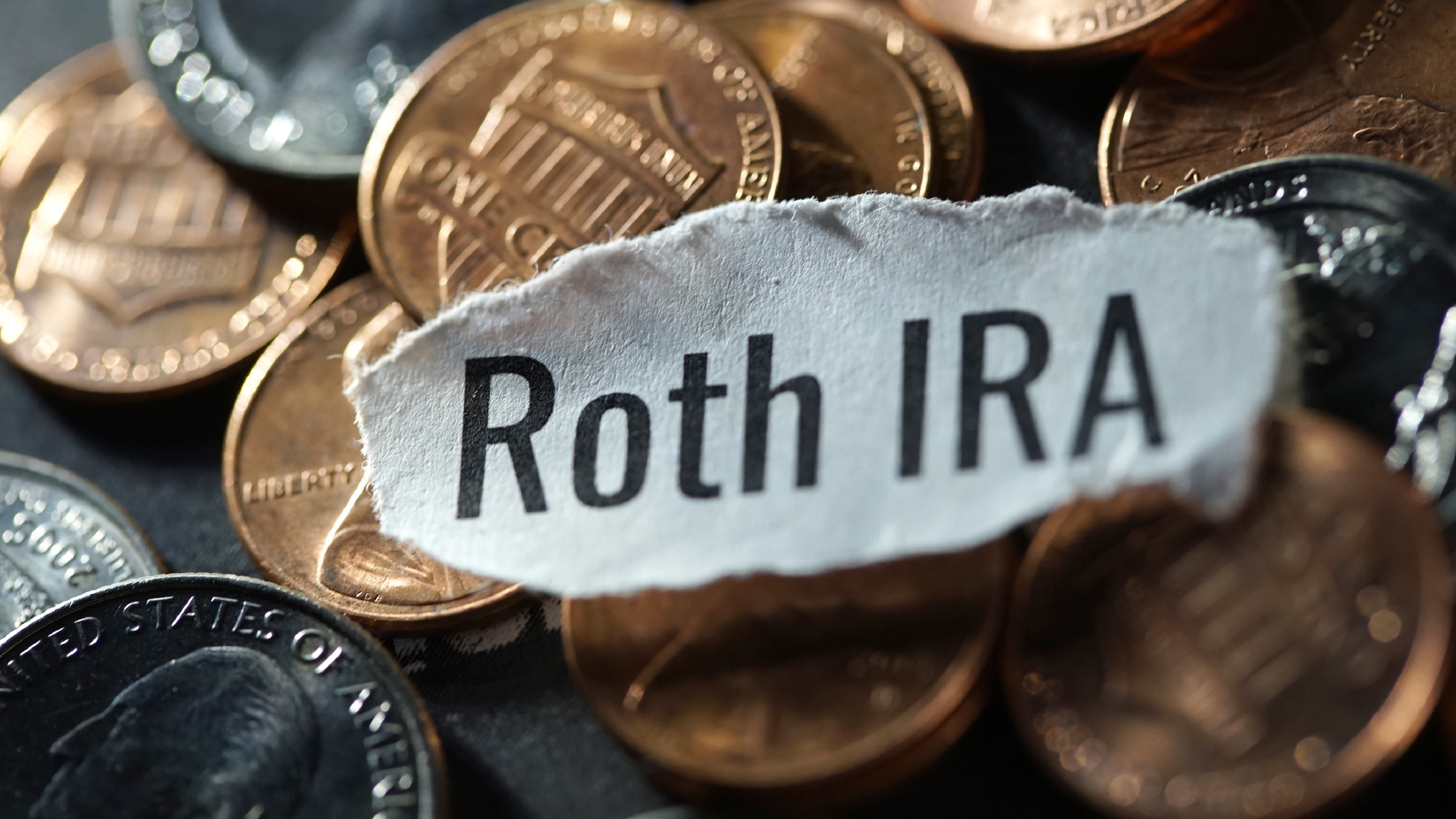Roth IRA Contribution Limits for 2026
Roth IRAs allow you to save for retirement with after-tax dollars while you're working, and then withdraw those contributions and earnings tax-free when you retire. Here's a look at 2026 limits and income-based phaseouts.


Profit and prosper with the best of Kiplinger's advice on investing, taxes, retirement, personal finance and much more. Delivered daily. Enter your email in the box and click Sign Me Up.
You are now subscribed
Your newsletter sign-up was successful
Want to add more newsletters?
Roth IRAs are a great way to save for retirement, allowing you to contribute after-tax dollars to an account where your contributions and earnings grow tax-free.
For 2026, the contribution limit for a Roth IRA is $7,500 (up from $7,000 in 2025), and includes an additional $1,100 catch-up contribution for those aged 50 and older (up from $1,000 in 2025).
You can also open and contribute to your 2026 Roth IRA until the due date of your 2026 tax return, which is Monday, April 15, 2027. (The deadline for 2025 contributions is April 15, 2026).
From just $107.88 $24.99 for Kiplinger Personal Finance
Become a smarter, better informed investor. Subscribe from just $107.88 $24.99, plus get up to 4 Special Issues

Sign up for Kiplinger’s Free Newsletters
Profit and prosper with the best of expert advice on investing, taxes, retirement, personal finance and more - straight to your e-mail.
Profit and prosper with the best of expert advice - straight to your e-mail.
Here's what you need to know about the 2026 Roth IRA contribution and income limits.
2026 Roth IRA contribution limits and income limits
The maximum amount you can contribute to a Roth IRA in 2026 is $7,500 (up from $7,000 in 2025) if you're under the age of 50. If you're 50 or older, you can add an extra $1,100 per year in "catch-up" contributions (up from $1,000 in 2025), bringing your total contribution to $8,600 for 2026 (up from a total contribution of $8,000 in 2025).
The actual amount you are allowed to contribute to a Roth IRA is based on your income. To be eligible to contribute the maximum amount in 2026, your modified adjusted gross income (MAGI) must be less than $153,000 if single (up from $150,000 in 2025), or less than $242,000 if married and filing jointly (up from $236,000 in 2025).
Contributions begin phasing out above these amounts, and you cannot put any money into a Roth IRA once your income reaches $168,000 if you are a single filer (up from $165,000 in 2025) or $252,000 if married and filing jointly in 2026 (up from $246,000 in 2025).
Roth IRAs vs. traditional IRAs: What's the difference?
Unlike contributions to a traditional IRA, which may be tax-deductible, a Roth IRA has no upfront tax break. Money goes into the Roth after it has already been taxed. But when you start pulling money out in retirement, your withdrawals will be tax-free.
Also, Roths — unlike traditional IRAs — are not subject to required minimum distributions (RMDs) after age 73.
Roths are also more flexible than traditional, deductible IRAs. You can withdraw contributions from a Roth account anytime, tax- and penalty-free. But you must be at least age 59-1/2, and you must have owned the Roth for at least five years. The clock on the five-year holding period starts ticking on January 1 of the year you open the account.
You can open a Roth IRA through a bank, brokerage, mutual fund or insurance company, and you can invest your retirement money in stocks, bonds, mutual funds, exchange-traded funds and other approved investments. You have until the federal tax filing deadline to make your Roth IRA contribution for the prior year.
Read: The Roth IRA Advantage: 10 Things Every Saver Needs to Understand
Roth IRA Pros | Roth IRA Cons |
Tax-free growth | Taxable contributions |
Qualified distributions are tax free | Not available for high-income earners |
Contribute to another person's Roth account as a gift | Lower income limits to contribute |
No required minimum distributions (RMDs) after age 73 | Rollovers from traditional plans are taxable |
Contributions can be withdrawn at any time, penalty- and tax-free | Earnings can’t be withdrawn tax-free until the account is at least five years old and you are age 59-½. |
Offers tax diversification in retirement | Relatively low contribution maximums |
| Row 7 - Cell 0 | Row 7 - Cell 1 |
Is a Roth IRA right for you?
There isn't a minimum age limit to open a Roth IRA, and you can contribute to another person's Roth account as a gift — perfect for parents looking to kick-start a child's retirement savings. Two caveats: Recipients must have earned income, and you can only contribute an amount up to that person's annual earnings, or $7,500 in 2026 (up from $7,000 last year), whichever is less.
Financial experts generally recommend Roth IRAs for people who anticipate a greater tax burden in retirement, whether because of rising income or higher tax rates in general. By paying the taxes on those contributions while your income or tax rate is lower, you’ll reap the benefit of tax-free money later when it counts more. This is especially true for someone who plans to retire in 2026 or later.
The passage of the One Big Beautiful Bill Act has made the current income tax rates permanent, meaning that the existing rates of 12%, 22%, and 24% will remain unchanged, and taxpayers will not face a return to the higher rates from 2017 as many anticipated.
Roth IRAs can also provide valuable tax diversification in retirement and can be a great way to balance other sources of income, such as withdrawals from a 401(k) or Roth IRA and Social Security payments. For instance, those tax-free Roth withdrawals in retirement won’t contribute to your taxable income, which is used to determine how much you pay for Medicare, including any surcharges (also known as income-related monthly adjustment amounts or IRMAAs).
Finally, note that if you invest in both a Roth IRA and a traditional IRA, the total amount of money you contribute to both accounts can't exceed the annual limit. If you do exceed it, the IRS might hit you with a 6% excessive contribution penalty.
Roth IRA savings tips
To make the most of saving for retirement in your Roth IRA:
- Max out your contributions in 2026. For each year that you're able, aim to hit the $7,500 limit.
- Once you turn 50, add another $1,000 to that limit annually. You can add funds to your Roth for as long as you have earnings from work.
- Avoid withdrawing funds you contributed to your account, even though you can do so without penalties or taxes. Letting that money grow in the account over many years means a bigger nest egg in retirement.
Why you should contribute to a Roth IRA
Roth IRAs let you contribute after-tax dollars. While there are no current-year tax benefits, your contributions and earnings can grow tax-free. You can also withdraw them tax- and penalty-free after age 59-½ if the account has been open for at least five years. This makes Roth IRAs an excellent way to save for retirement.
And, with the passage of the SECURE 2.0 Act, you may be eligible to contribute to your Roth IRA using 529 rollover assets. Traditional IRAs do not qualify for this option.
We curate the most important retirement news, tips and lifestyle hacks so you don’t have to. Subscribe to our free, twice-weekly newsletter, Retirement Tips.
Related Content
- The 'Take That, Uncle Sam' Rule of Retirement Spending
- Want to Reduce the IRMAA? Consider a Roth Conversion
- The Roth IRA Advantage: 10 Things Every Saver Needs to Understand
- Inherited an IRA? Four Things Every Beneficiary Should Know
Profit and prosper with the best of Kiplinger's advice on investing, taxes, retirement, personal finance and much more. Delivered daily. Enter your email in the box and click Sign Me Up.
Jackie Stewart is the senior retirement editor for Kiplinger.com and the senior editor for Kiplinger's Retirement Report.
-
 8 Boring Habits That Will Make You Rich in Retirement
8 Boring Habits That Will Make You Rich in RetirementThese mundane activities won't make you the life of the party, but they will set you up for a rich retirement. Discover the 8 boring habits that build real wealth.
-
 QUIZ: Are You Ready To Retire At 55?
QUIZ: Are You Ready To Retire At 55?Quiz Are you in a good position to retire at 55? Find out with this quick quiz.
-
 10 Decluttering Books That Can Help You Downsize Without Regret
10 Decluttering Books That Can Help You Downsize Without RegretFrom managing a lifetime of belongings to navigating family dynamics, these expert-backed books offer practical guidance for anyone preparing to downsize.
-
 8 Boring Habits That Will Make You Rich in Retirement
8 Boring Habits That Will Make You Rich in RetirementThese mundane activities won't make you the life of the party, but they will set you up for a rich retirement. Discover the 8 boring habits that build real wealth.
-
 QUIZ: Are You Ready To Retire at 55?
QUIZ: Are You Ready To Retire at 55?Quiz Are you in a good position to retire at 55? Find out with this quick quiz.
-
 New Ways to Keep Online Accounts Safe
New Ways to Keep Online Accounts SafeAs cybercrime evolves, the strategies you use to protect yourself need to evolve, too.
-
 Can Your Car Insurance Add Strangers to Your Policy? A Florida Class Action Lawsuit Could Decide
Can Your Car Insurance Add Strangers to Your Policy? A Florida Class Action Lawsuit Could DecideA Florida driver says GEICO added complete strangers to her car insurance policy and jacked up premiums as a result.
-
 Will Your Children's Inheritance Set Them Free or Tie Them Up?
Will Your Children's Inheritance Set Them Free or Tie Them Up?An inheritance can mean extraordinary freedom for your loved ones, but could also cause more harm than good. How can you ensure your family gets it right?
-
 I'm a Financial Adviser: This Is the Real Key to Enjoying Retirement With Confidence
I'm a Financial Adviser: This Is the Real Key to Enjoying Retirement With ConfidenceA resilient retirement plan is a flexible framework that addresses income, health care, taxes and investments. And that means you should review it regularly.
-
 Life Loves to Throw Curveballs, So Ditch the Rigid Money Rules and Do This Instead
Life Loves to Throw Curveballs, So Ditch the Rigid Money Rules and Do This InsteadSome rules are too rigid for real life. A values-based philosophy is a more flexible approach that helps you retain confidence — whatever life throws at you.
-
 3 Smart Ways to Spend Your Retirement Tax Refund
3 Smart Ways to Spend Your Retirement Tax RefundRetirement Taxes With the new "senior bonus" hitting bank accounts this tax season, your retirement refund may be higher than usual. Here's how to reinvest those funds for a financially efficient 2026.